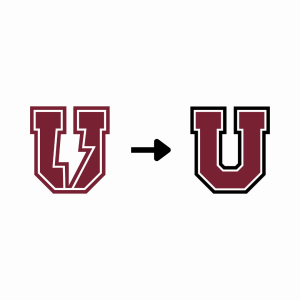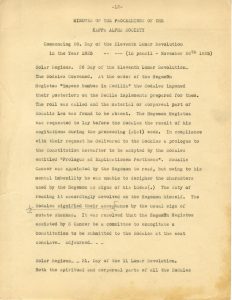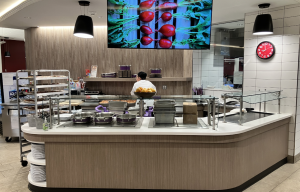STEM Alumnae Stories, Advice
April 21, 2022
On 7PM, Tuesday, April 19, Maggie Hoffman ’15 moderated “An Evening with Alumnae Rising Stars in STEM”, in which Paige Kotowitz ’18, Sharifa Sahai ’18 and Nora Swidler ’14 discussed their times at Union and in STEM, giving advice for current students. Union’s Gold Network, which connects alumni to Union through networking events, volunteer opportunities and encouraging philanthropic support, sponsored the event.
Hoffman began with her post-Union story. She returned from a Minerva Fellowship in Cambodia needing a job, not knowing what to do. She sat with Becker Career Center’s Bob Soules, who said, according to her, “if you want to learn in the best, brightest, most fast-paced environment, go to technology”. Hoffman ended up working for Dell, where she has been for the last five years.
Kotowitz, a chemistry major and psychology minor, entered Union “fully undecided” with “science not at the top of” her list. She was “randomly placed into Chem 101” and said she “really enjoyed hands-on” lab classes, citing chemistry as the “central science”. Post-Union, she joined San Diego nanotechnology company nanoComposix’s research and development team, learning “the importance of real-world science applications”. She is now in the first-year of a Chemistry PhD at University of California, Los Angeles.
Sahai had liked science since elementary school science fairs. A double major in computer science and biology, she studied abroad thrice at Union (Australia, Ethiopia, Fiji). She entered as a biology premedical student, and heard from professors in her computer science class that bioinformatics and computational medicine would be “real big” in the future. She cites her sophomore year NASA internship as steering her toward a PhD: “everyone who worked there” had one. Union professors who wanted her to be a professor also influenced her to a PhD. Post-Union she deferred a Harvard acceptance for a Google software engineer job, but missed research and biology. She is now a third-year Harvard PhD candidate while studying in Harvard Medical School’s Department of Systems Biology.
Swidler, a French major and philosophy minor, says she “took advantage in everything” at Union. She studied abroad in France, was panhellenic president her junior year, was on the basketball team, and “studied what [she] was interested in”. She worked in reality television casting her first year post-Union, but found she wanted a different career: “Forged in Fire was a cool show, but I wanted to use my skill set”, says Swidler, which was being able to make information interesting and compelling. She was “kind of lost” until, three years post-Union, she also went to Soule, who told her to pursue sales, which had been “in the back of [her] mind the whole time”. She went into tech sales at Uber Eats, then Salesforce, and in the last two months, Google, where she is Digital Strategy Lead.
When asked why she pursued STEM, Sahai said that in medicine, a doctor can help a certain number of people, but that computational biology or computational medicine can have a much larger impact even if the careers have a “longer horizon”. She has hard days, and though sometimes “her research doesn’t work out” or she worries it won’t be used enough by people, she “[has] to think [she’ll] have many projects” later and appreciates gaining skills now. She appreciated software engineering too for acquainting her with an alternative career.
Kotowicz said PhDs are “not for the faint-hearted” but is “overall very happy” with hers, which was “the best option” for her career goals. She cites its independent research project opportunities as “such a unique opportunity in academia”, though she knows there are many biology “opportunities in master’s and bachelor’s levels”.
Swidler cites her software as service (SAS) experiences early in her sales career as letting her “sink [her] teeth” into cold calling, as well as helping her convey complex concepts. In her jump from liberal arts to STEM, she cites her skill at interviewing: she can understand then fit a need, which “translated [perfectly]” to sales. She likes being the “person in the room everyone can go to”.
Many of Hoffman’s skills from Union (being teachable, listening, working in teams) helped her support those who develop and code. Praising Union’s “cross-discipline degrees” she said she “can understand enough high-level things to empathize and communicate.” Kotowicz also praised writing skills she developed at Union as being “incredibly useful” in her PhD.
Speakers were then asked about being women in STEM. Swidler said she was “very lucky to be raised by incredible, powerful parents who made sure [she] had a powerful voice”, because in her career she was surprised “how much [she’d] see people specifically try to break [her] spirit.” She was “called sweetie, sexy or baby more times than [she] could imagine in the workplace”, she said. She also recalled topping the sales board for four months at Uber Eats while male coworkers made $6 more an hour than she. But, she has “never seen a greater sense of inclusivity than at Google”, where she has seen feminine hygiene products in men’s and women’s restrooms, accomodations for those observing Ramadan, and Kosher catering.
Sahai recalled a “very large gender imbalance” in her Union classes, where men “tended to be more loud”, confident, and seemed to know more. She came to realize that some people who knew more had just started earlier, and that many of their talents were not innate. She spoke for starting girls in STEM much earlier on, to build their confidence. At Google she has seen no “discrimination or outright sexism” but says that can depend on one’s manager or team. Her Harvard program is about half women, and she sees balance and opportunity for them there.
Kotowicz described her time at Union as a “bubble” as her graduating chemistry class was “predominantly” female. At work she saw a “big shift” toward the norm as she “first saw hardships as a female in STEM.” She has had “opportunity in very supportive environments pretty much each step of her career” but has experienced feeling a “need to speak up more” in meetings while not being “too outspoken”. She also said she has dealt with wage gaps and “other small interactions” but cites “overall very good experiences.”
Many speakers also related to imposter syndrome. Kotowicz said it is “very real” and that one should “take small victories[…] to heart”, herself having been unsure about pursuing STEM as she left Union. She applied to non-technology jobs including consulting and business-oriented positions but ended up “very grateful for [her] research position.” She hopes those pursuing STEM careers can “recognize [they] are in the right place”. Swidler said her sales metrics are helpful, as they easily gauge her success. She says “how did i get here” moments have gone away in the last four or five years. Sahai said that till she arrived at NASA, she worried they had made a clerical error in admitting her, but that positive feedback built her confidence and made her much more comfortable from then on.
In the Q&A segment, Sahai took a question about gap years after leaving Union before pursuing a PhD. She said she applied to 10 PhD programs and 30 jobs as a senior, including fellowships (she turned down a Fulbright scholarship to work at Google). She said one should weigh their options and that most programs allow a year of deferral, in which one can try a job. This, she said, can let people define later research goals. Some Google coworkers had also foregone PhD programs in favor of higher salaries or starting families. Kotowicz took three years after Union. Though the average person starts within two years, she said she is “not the only one”. Breaks to her are “a personal choice”; she wasn’t ready to start a PhD right away. She used her gap to gain technical confidence, and said it was worth it, even if studying for a GRE after being out of school two or three years was “very difficult”. She also said that it may make sense to earn more money in a job for some time than one would in a PhD. Generally, she recommended taking risks, not fearing setbacks, and taking advantage of all one can. Swidler also noted that one doesn’t have to be a “researcher or creator to be in STEM” and that they can “aid or assist” which is “just as important on a team.”
At the talk’s end Hoffman recommended using the Union network, citing a “very special bond between us Union alums and current students.”







